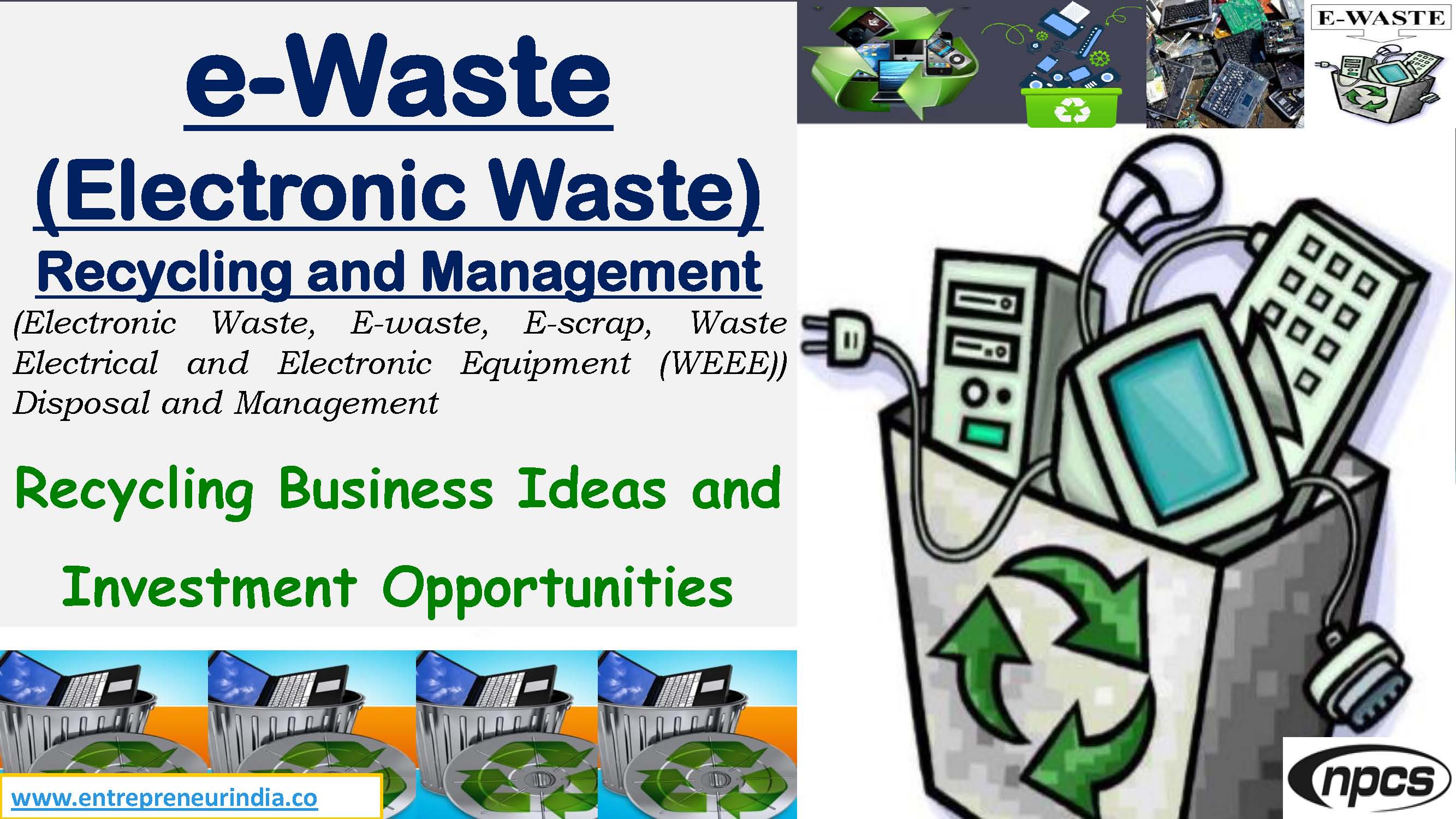
India generates over 3 million tonnes of e-waste annually, and the number is rising with the rapid adoption of technology. Every discarded smartphone, outdated laptop, broken television, or electronic appliance becomes part of this massive digital debris. But in this challenge lies a powerful opportunity: E-Waste Recycling. From extracting valuable metals to ensuring safe disposal of toxic materials, e-waste management is not just a responsible business—it’s a profitable one. Moreover, increased environmental awareness and government regulations are opening new doors for entrepreneurs in this green sector.
Read Also :Spice Factory
E-Waste Recycling & Management | Profitable Business Ideas
E-Waste Collection & Sorting Center
The foundation of any E-Waste Recycling business is an efficient collection system. You can set up collection bins or centers in housing societies, IT parks, schools, and commercial complexes. After collection, e-waste is sorted into categories such as PCBs, batteries, plastics, and metals.
Moreover, partnering with corporations through EPR (Extended Producer Responsibility) can secure a regular inflow of electronic waste.
Manual Dismantling Unit
Dismantling involves separating reusable parts and recyclable materials from e-waste. This includes removing RAMs, hard drives, circuit boards, and cables. It requires basic hand tools, workstations, and trained staff. Safety gear is essential for handling sharp or hazardous components.
Moreover, this stage creates employment and is ideal for small-scale entrepreneurs entering E-Waste Recycling.
Shredding and Material Separation
Shredding equipment crushes e-waste into small pieces for efficient separation of plastic, metals, and glass. The separation process uses magnets, eddy current separators, and air classifiers to isolate valuable materials.
Moreover, automation at this stage enhances throughput and ensures better purity of recovered elements.
Precious Metal Recovery
E-waste is a goldmine—literally. Circuit boards contain gold, silver, platinum, and copper in trace amounts. Using chemical leaching or electrolysis, these can be extracted with precision.
However, due to chemical use, this requires pollution control measures and trained technicians. Moreover, the high market value of recovered metals makes this one of the most lucrative aspects of E-Waste Recycling.
Plastic and Glass Processing
Recovered plastic from electronics can be shredded, cleaned, and melted into granules. These are reused to manufacture plastic items like chairs, bins, and panels. CRT and LCD screens are crushed and safely processed or disposed of using appropriate safety protocols.
Moreover, repurposing plastic reduces environmental impact and adds another revenue stream.
Battery Recycling
Lithium-ion and lead-acid batteries must be handled with care due to their hazardous content. Specialized equipment is required to discharge, dismantle, and recover metals like lithium, cobalt, and nickel.
Moreover, as electric vehicles grow in popularity, battery E-Waste Recycling will become even more critical and profitable.
Refurbishing and Resale Unit
Not all discarded electronics are unusable. Refurbishing involves repairing and reconditioning items like laptops, phones, and printers. You can sell them as certified refurbished products through your own store or online platforms.
Moreover, this reduces waste, saves money for buyers, and enhances your brand’s sustainability image.
Data Destruction Services
Companies often need to destroy old hard drives securely to comply with data protection laws. You can offer degaussing, shredding, or wiping services and provide clients with digital certificates.
Moreover, this niche service appeals to banks, IT companies, and government departments.
E-Waste Logistics & Pickup Services
If you’re not ready to recycle but want to get started, offer logistics and collection services. You can pick up e-waste from offices, homes, or retailers and deliver it to certified recyclers.
Moreover, tech-enabled tracking, scheduled pickups, and app-based interfaces make this model scalable and modern.
Legal Compliance and Licensing
To operate a compliant E-Waste Recycling business in India, you must obtain:
-
Authorization from the Central Pollution Control Board (CPCB)
-
Registration with the State Pollution Control Board
-
EPR authorization if collaborating with OEMs
-
Factory license (if required)
-
Hazardous waste management approval (for battery/CRT units)
Moreover, follow e-waste management rules, 2022, and ensure safe and traceable recycling processes.
Investment and Profit Margin
Your capital requirement depends on your chosen model:
| Type of Project | Investment Needed | Potential Monthly Profit |
|---|---|---|
| Collection Center | ?2–5 lakhs | ?30,000–?75,000 |
| Manual Dismantling Unit | ?6–10 lakhs | ?50,000–?1 lakh |
| Semi-Automated Recycling Plant | ?25–40 lakhs | ?1–3 lakhs |
| Precious Metal Recovery | ?50+ lakhs | ?2–5 lakhs |
Government Support and Incentives
The Indian government encourages eco-friendly businesses with several schemes:
-
Startup India: Recognition and benefits for green startups
-
MSME Loans: Low-interest credit for small recycling units
-
Subsidies & Capital Grants: Offered in states like Gujarat, Tamil Nadu, and Maharashtra
-
Skill India: Training programs for technicians in e-waste handling
Moreover, integration with Smart Cities and Swachh Bharat initiatives can bring long-term institutional contracts.
Market and Customer Base
Your potential clients include:
-
IT firms and data centers
-
Telecom companies and retailers
-
Educational institutions and hospitals
-
Government departments
-
B2C platforms for refurbished goods
Moreover, online portals like IndiaMART and e-Waste Exchange help find consistent buyers and sellers.
See Also :Spice Powder
Conclusion
The rising tide of discarded electronics is a global concern, but for smart entrepreneurs, it’s also a business goldmine. E-Waste Recycling offers an ideal blend of social responsibility, profitability, and long-term growth. Whether you choose to collect, refurbish, or extract metals, each model has viable income potential. Moreover, government support, low competition in regional markets, and scalable business models make this a sector worth exploring now.
Would you like a PDF project report, financial forecast, or license checklist to launch your own E-Waste Recycling business? I’d be happy to help.





